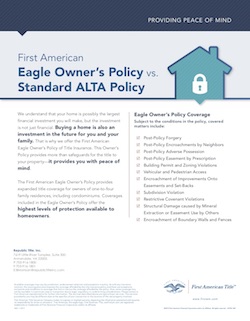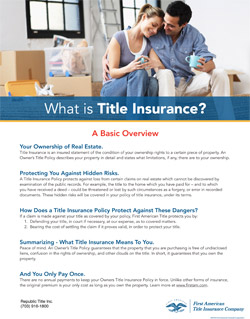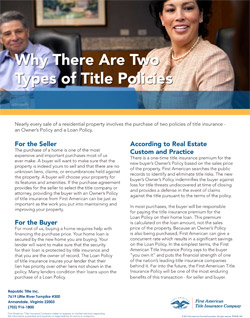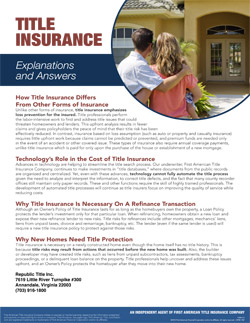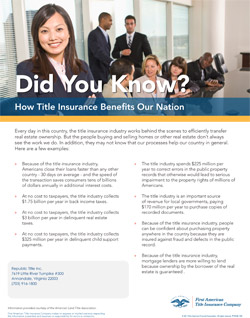Republic Title, Inc.
"Researching the Past to Secure Your Future"
***Best Practices certified by Secure Insight, Inc***
The Importance of Insurance
We are often asked about the purpose of Owner's Title Insurance. The most prevalent question is, "If my lender is obtaining a title insurance policy to protect its loan, why do I need one, too?"
There is a difference between an Owner's Policy and a Lender's Policy:
Lender's Policy -- Insures that the lender has an enforceable mortgage lien and that it is secured in the proper position of collection priority. In other words, that there are either no other liens ahead of them or, if there are, they are aware of them and accept them as a part of their loan product, (i.e., a second deed of trust or a home equity loan).
Owner's Policy -- Insures that the owner has the legal and insured right to title without interference from parties claiming a right to that property. This may be from a lost or missing heir of any prior owner or any person who may have held an ownership interest in the property, and failed to convey that interest to successive owners.
A common instance where an Owner's Title Insurance Policy is important is if, for any reason, a lien is not properly released from the property. You purchase a property and the sellers have a deed of trust on it which is paid off at closing. But for some reason, the release documents are never recorded. If you decide to sell the property and a new title search is performed, that lien will show as open on the land records. This discovery can delay or nullify your sale. However, with an Owner's Title Insurance Policy, you may be able to proceed to closing with indemnification by your insurer.
The same scenario could occur with any lien that is revealed from subsequent title examinations -- which are performed each time you sell or refinance your property. Insured owners receive a delinquency notice from the local tax office for unpaid taxes or the homeowners association for unpaid fees. Often, it's simply a clerical or billing error, but it takes many hours and many phone calls to fix the problem. In many cases, there are unpaid balances. As a part of our coverage to the insured, we have written a check to settle the accounts and prevent further action. Even "non-claims" can be cumbersome and expensive to research and correct. Actual monetary losses for failure of title or performance are extremely costly and can be financially devastating to an owner who does not have title insurance.
The following is a brief list of risks protected against with an Owner's Title Insurance Policy:
- Undisclosed or missing heirs
- Lack of mental competence by grantors
- Clerical errors in recordation of documents procedure
- Judgments or liens filed against prior owners
- Conveyance by a minor
- Unsatisfied claims not shown of record or not immediately apparent
- Delivery of deed by non-authorized person(s)
- Incorrect indexing of documents by clerks office/recorder of deeds
- A third part claims an interest in the title
- Documents executed under fraud or duress (pre-policy)
- Non-recorded restrictive covenants
Think twice before choosing to go without Owner's Title Insurance. It's a one-time premium that affords you with peace of mind on a most important investment -- your home.
Title Insurance FAQs
What is title insurance?
Title insurance is an insurance policy that protects the insured against loss should the condition of title to land be other than as insured.
Why do I need title insurance?
When you buy a home, or any property for that matter, you expect to enjoy certain benefits from ownership. For example, you expect to be able to occupy and use the property as you wish, to be free from debts or obligations not created or agreed to by you, and to be able to freely sell or pledge your property as security for a loan. Title insurance is designed to ensure these rights.
What does title insurance cost?
The cost varies, depending mainly on the value of your property. The important thing to remember is that you only pay once, and the coverage continues in effect for so long as you have an interest in covered property. If you should die, the coverage automatically continues for the benefit of your heirs. If you sell your property, giving warranties of title to your buyer, your coverage continues. Likewise, if a buyer gives you a mortgage to finance a purchase of covered property from you, your coverage continues to protect your security interest in the property.
If I have a problem, will I have to lose my property to make a claim?
Not at all. At the mere hint of a claim adverse to your title, you should contact your title insurer or the agent who issued your policy. Title insurance includes coverage for legal expenses that may be necessary to investigate, litigate or settle an adverse claim.
If my lender obtains title insurance, why do I also need it?
The lender's policy covers only the amount of it's loan, which is usually not the full property value. In the event of an adverse claim, the lender would ordinarily not be concerned unless it's loan became non-performing and the claim threatened the lender's ability to foreclose and recover its principal and interest. And, in the event of a claim, uninsured party must cover their own legal expenses. All in all, the small additional expense of an owner's policy is a bargain.
What types of claims or risks are covered by title insurance?
Standard Coverage addresses:
- forgery and impersonation
- lack of competency, capacity or legal authority of a party
- deed not joined in by a necessary party (co-owner, heir, spouse, corporate officer, or business partner)
- undisclosed (but recorded) prior mortgage or lien
- undisclosed (but recorded) easement or use restriction
- erroneous or inadequate legal descriptions
- lack of a right of access
- deed not properly recorded
First American's Eagle Policy covers all of the risks listed above plus:
- off-record matters, such as claims for adverse possession or prescriptive easement
- deed to land with buildings encroaching on land of another (incorrect survey)
- silent (off-record) liens, such as mechanic's or estate tax liens
- pre-existing violations of subdivision laws, zoning ordinances or CC&R's (Covenants, Conditions & Restrictions)
- post-policy forgery
- forced removal of improvements due to lack of building permit (subject to deductible)
- post-policy construction of improvements by a neighbor onto insured land
- location and dimensions of insured land (survey not required)
